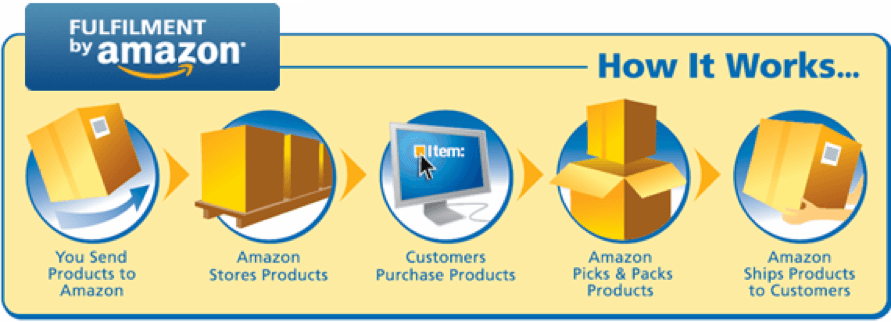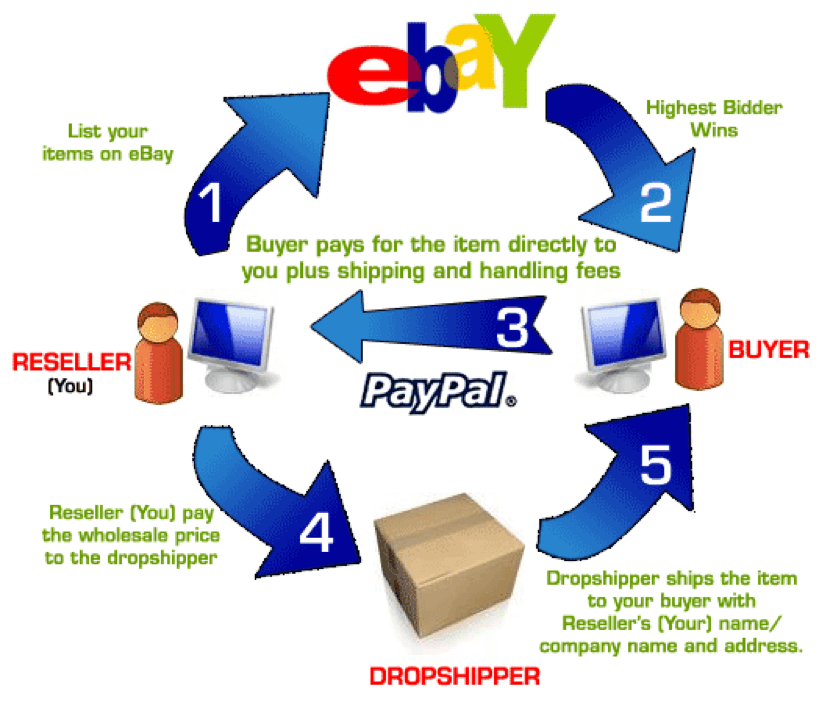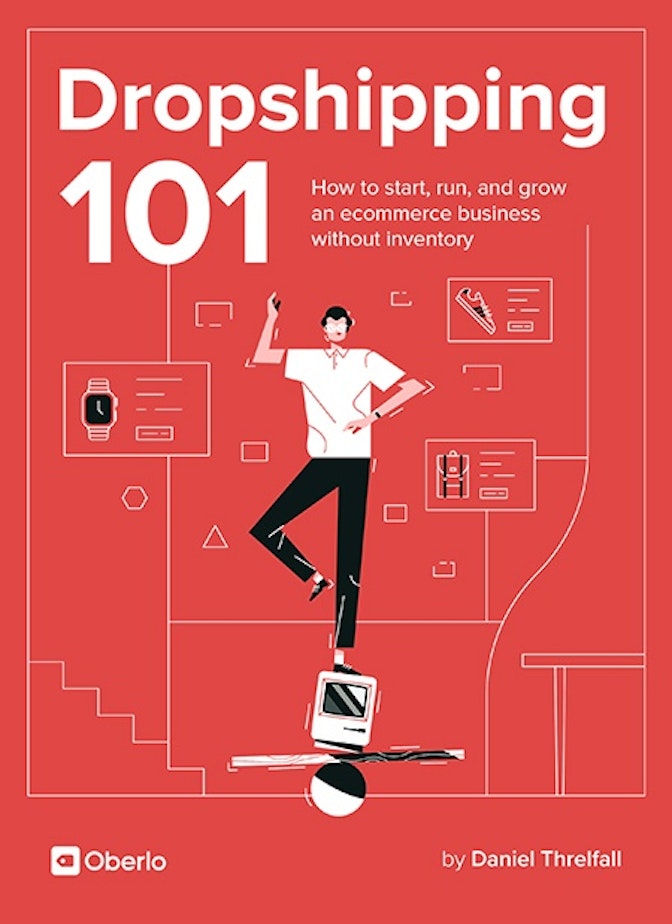It’s finally time to get into the good stuff: making sales. If you’ve made it this far, you’ve gotten a lot of the administrative stuff out of the way, and you’re ready to start building your actual store.
Earlier I mentioned we’d be covering different sales channels. This is such a deep topic that I’ve devoted an entire chapter to it.
A sales channel is a platform you use to sell products. This can be a Shopify store, a dropshipping website of your own, or a seller account on a product site like eBay.
The sales channel is another foundational element to a dropshipping business. The platform you use to sell will determine how you sell. You’ll be subject to the flexibility (or lack of flexibility) of your channel, and the audience you reach (and how you reach them) will be extremely dependent on the sales platform you choose.
As you might be able to guess, there are lots of options out there. This is mostly a good thing, but it can leave you confused as to what you should choose. Each sales channel has its own pros and cons, and you need to closely evaluate them before you make a decision.
You can use multiple sales channels if you want, but you’ll have to juggle all the different tasks and responsibilities. In most situations, this isn’t too difficult, but you might want to start out with just one sales channel and then start using others.
There are three popular sales platforms: eBay, Amazon, and custom online storefronts (typically using ecommerce software or plugins). None of these platforms are inherently better or worse than the others, so you’ll have to spend some time familiarizing yourself with each one. You’ll likely find that one option is best for you.



Dropshipping on Amazon
When it comes to choosing a dropshipping website, Amazon seems like an easy choice. It’s one of the biggest online marketplaces in the world, and it’s a hotspot for dropshippers.

→ Click Here to Launch Your Online Business with Shopify
Many of the products you see listed on Amazon are actually sold by third-party merchants. But is Amazon really that good for dropshippers?
There’s no doubt that Amazon has plenty of advantages, but it’s not without its own issues. In some ways it’s convenient, and in other ways it can be really detrimental to dropshippers. Here are some of the pros and cons you should be aware of if you’re considering using Amazon as your first dropshipping platform.
Pros of Dropshipping on Amazon
It exposes your products to an enormous audience. By listing your products on Amazon, you’ll instantly get in front of millions and millions of people. This is the kind of attention you’d have to spend years to achieve on your own. And since many Amazon shoppers buy from third party merchants, you’re almost guaranteed a colossal amount of free traffic no matter what you’re selling.
It’s trustworthy. These days, people treat Amazon like a local big box store. Shopping on Amazon has become a casual affair, and it’s often where people go to buy any number of products. That means your customers might already regularly browse Amazon to purchase items they need.
You get access to Fulfillment by Amazon (FBA). With FBA, retailers ship products to Amazon, who then ships out the orders. If you have products of your own to sell, FBA can give you an additional revenue stream. This isn’t a huge perk, but it’s nice to have.
Cons of Dropshipping on Amazon
The listing fees are substantial. Like eBay, Amazon imposes hefty listing fees that are typically in the neighborhood of 10 to 15 percent. And that’s on top of the monthly $39.99 base fee. If your margins are already low, this will cut into your profits quite heavily, but it’s the cost you’ll have to pay if you want that potential exposure to millions of buyers.
The competition is insane. Amazon’s popularity is a double-edged sword. On the one hand, it means lots of people will see (and hopefully buy) your products. On the other hand, it means there’s lots of competition. It doesn’t help that many third-party Amazon sellers automate their listings to continuously adjust their prices to be the lowest. This creates pricing wars, which is bad news for dropshippers. Undercutting your competition all the time is no way to stay in business, so this is a real problem for dropshippers.
The payment situation isn’t ideal for everyone. There are two big problems with how Amazon deals with payment. First, it doesn’t accept PayPal. This is obviously a huge issue, as PayPal is how millions of people prefer to pay. Second, sellers only get paid every two weeks, and this is less than ideal for many entrepreneurs.
Dropshipping on eBay
To put it lightly, eBay is an enormous sales platform. Many people trust eBay, and millions of people use it to go shopping and buy products. It’s similar to Amazon in many respects, and the two sites share many of the same advantages.

However, since eBay is an auction site, it’s a little different than the other two options. It can be invaluable for dropshippers just starting out, but it comes at a price – literally.
Pros of Dropshipping on Ebay
It’s huge. One of eBay’s most appealing features is its sheer size. Dropshipping on eBay will give you instant access to millions of customers who have their wallets out, ready to buy. This means you can do less marketing and work more on leveraging the platform itself.
It’s easy. Dropshipping on eBay is easy to set up. You can easily manage everything all by yourself without the need for any assistants or team members. If that weren’t enough, eBay makes payment processing and finances a lot easier.
It’s trustworthy. Customers trust eBay because of its seller protection policies, which can benefit new dropshippers. Many buyers will purchase from brand new sellers because they know they’re covered if something goes wrong. This makes it easy for you to attract customers and build a positive reputation.
Cons of Dropshipping on Ebay
The fees can add up. eBay is notorious for its high fees – the ecommerce giant takes up to 10 percent of a sale (and in rare cases, even more). These fees are somewhat of a necessary evil and a tradeoff for selling on such a big platform, but this does dissuade some entrepreneurs from choosing eBay as a dropshipping platform.
Its auction style isn’t always ideal for dropshipping. With a dropshipping business model, you list a product and keep that listing up indefinitely. eBay doesn’t work like this because it’s an auction platform, which means there’s a time limit for all listings. You’ll have to relist your items once the listings expire. This can be time consuming and make you postpone more important things.
It’s limiting. With eBay, your hands are tied. There’s a lot you can’t do, like build an email list or design your own storefront. You have to play by eBay’s rules, and you’re more or less stuck on eBay. This means you won’t get many repeat customers, you can’t really build an audience, and you can’t brand yourself. Suffice it to say, this can get frustrating. It can also make it harder for you to stand out since virtually every eBay store looks exactly the same.
Dropshipping on Your Own Website
While it won’t give you the ability to get your inventory in front of millions of customers, a dropshipping website of your very own can provide you with advantages you won’t get any other way. You’ll get a lot of freedom, but you’ll have to make some compromises.
Setting up a dropshipping website from scratch may sound overwhelming, especially if you don’t have any prior experience, but it’s surprisingly easy thanks to ecommerce software like Shopify. You can easily create a site and integrate an ecommerce plugin to make your store, no experience necessary. Chapter 3 of Oberlo’s Make Money From Home ebook offers some insight into the process. But is this the right choice for you? Here are some points to think about.
Pros of Setting up Your Own Dropshipping Website
You have complete control. You can decide everything that makes up your store, from the placement of your logo to the format of your pages. Most importantly, you can communicate your value to your readers, and this can give you a serious edge over your competition.
You don’t have to pay outrageous fees. Without a third party to take a cut, you can considerably increase your profit margins. Those 10 to 15 percent listing fees that Amazon and eBay charge? Forget about them. You now only have to worry about payment processor fees and the cost of the actual products.
It’s easier for customers to buy on mobile. Ever tried to use your mobile device to buy something off a sales platform like Amazon or eBay? It’s not always pleasant. With your own dropshipping website, you can easily make your site responsive and mobile-friendly for your customers. Better yet, if you use a platform like Shopify, you can manage your entire business from your mobile device, so you can keep an eye on things even when you’re on the go.
You can stand out. All Amazon pages look the same, just like all eBay pages look the same. Having a dropshipping website of your own lets you implement your branding and make a lasting impression on your audience. This can make a big difference, and it will help you build your brand and draw in a loyal audience of return customers. There are other benefits as well, which you can learn about by watching our video: Dropshipping vs Amazon.
Cons of Setting up Your Own Dropshipping Website
You don’t have access to a large audience. Having your own site means building an audience from the ground up. You’ll have to put more time, money, and effort into marketing, traffic generation, and outreach.
It can take a long time to get off the ground. You won’t be making sales immediately like you would on Amazon or eBay. It’s going to take some time to attract customers and make consistent sales.



How to Choose a Sales Platform
So you might be asking yourself, “Which dropshipping platform is right for me?” I can’t decide for you, but I can help. To choose the best platform for your business, you’ll need to ask some questions and evaluate your priorities. First, think about which is more important to you: higher profit margins or more exposure to an audience.
If you’re interested in making the most money, you should probably consider creating a dropshipping website of your own. This strategy will take longer, but you’ll wind up with more money in your pocket, and you’ll be able to build a customer base.
If you’re more interested in getting your product in front of lots of people, then Amazon or eBay may be right for you. This will cut your margins, but you’ll get sales more quickly.
Second, think about your long-term goals. How do you want to be selling your product a year from now? What about five years from now?
In other words, how much control do you want over selling your products? Your own dropshipping website will give you the most control, while platforms like Amazon or eBay will limit you in many ways. When it comes to control over branding, sales, and pretty much everything else, a website of your own is hard to beat.
Finally – and this is the most important factor – think about how you’ll bring value to your customers. More specifically, think about which platform will allow you to provide the most value.
I discussed earlier different ways to provide value, and you might have a few ideas in mind. Which sales platform(s) will best facilitate those ideas?
Personally, I’ve had the best experience with a custom dropshipping website paired with ecommerce software like Shopify. It gives you a ton of control, makes it easy to sell, and increases your profit margins. It also gives you more opportunities to brand yourself, retain customers, and market your store.
While you can switch to another dropshipping platform rather easily, there’s one thing to bear in mind. If you start out on Amazon or eBay and want to move to a dropshipping website of your own, you’ll have no way to relocate your customer base to your own site. Your positive reviews and customer experiences will be confined to that platform.
Regardless of which platform you opt for, you’ll need to think about branding and digital marketing. You can have the best products and still fall short if you don’t have a memorable brand. The good news is that with a little bit of know-how, you can create an amazing brand that will help your business stand head and shoulders above your competition.


